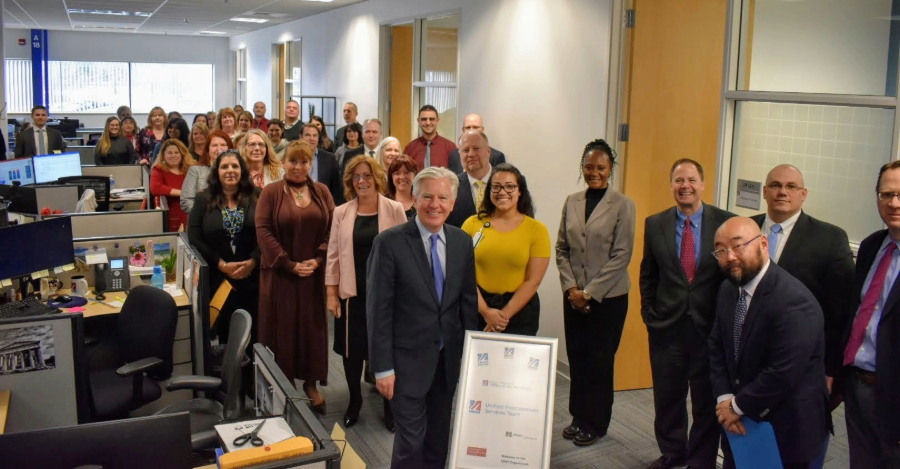
A Q&A with LeeAnn Pasquini and David Nero
LeeAnn Pasquini is the Associate Vice President for Administration & Finance, and her work has always emphasized efficiency and financial stewardship. "For years, UMass has demonstrated its commitment to cost savings and transparency through our Efficiency & Effectiveness report. The principles behind UPST were born out of this same commitment."
David Nero is the Associate Vice President for Strategy and Innovation. He defines his role as being to drive the shared services initiative from concept to full implementation. "Rising fixed costs in areas like collective bargaining and financial aid challenged us to find ways to control expenses without impacting quality. By taking a system-wide approach, UPST enables us to leverage economies of scale across campuses, enhancing efficiency and reinvesting savings into campus programs."
What was the original vision for UPST, and how did it come into being?

In 2018, UMass engaged Accenture to explore shared services as a strategic path to reducing costs and improving service quality. While initial steps focused on procurement, accounts payable, and payroll, it was under President Meehan’s leadership that we were challenged to think more boldly. He understood that for campuses facing growing financial pressures, a transformative approach was necessary. This vision of cost-saving, system-wide efficiencies ultimately led to UPST’s formation and our focus on transparent, high-quality service.
Who were the key stakeholders in this process, and how did they shape UPST?
Internally, our primary stakeholders were the campus departments involved in procure-to-pay functions, as well as all departments purchasing goods and services. Externally, our relationships with vendors and suppliers were essential to ensure we could meet their needs efficiently. Engaging a broad group of stakeholders helped us build a foundation of trust and collaboration, which was crucial for a smooth transition to shared services.
Transitioning to a shared services model is a significant shift. What were some challenges, and how did you overcome them?
Moving from a campus-based to a shared-services structure required a complete overhaul. It wasn’t just about changing processes; it involved rethinking staffing, budgeting, and policy. One of our greatest challenges was carefully managing these changes while keeping everyone informed and engaged. To address this, we made sure to involve campus leadership every step of the way to navigate the personnel aspects of the reorganization with sensitivity and respect.
Five years in, would you consider UPST a success? How do you measure that success?
Without a doubt, UPST has been a success. We initially streamlined our team by reducing positions through attrition and vacancy management, which allowed us to work more efficiently without sacrificing service quality. Since then, we’ve saved and avoided costs totaling $145.7 million, which have been reinvested into our campuses. Additionally, with tools like SPARC Pro, we’ve improved transparency, enabling campus leaders to access key procurement data with ease, which supports better decision-making.
How does UMass keep the momentum for shared services alive?
Momentum comes from a commitment to continuous improvement. Shared services aren’t something with a defined endpoint—it’s an evolving initiative that requires us to stay agile and responsive. We’re constantly looking for ways to enhance customer service, and we’re exploring new technologies, like AI-driven dashboards, to support real-time insights. Our goal is to ensure UPST remains a valuable resource that continually adapts to campus needs.
For other organizations considering a similar transformation, what advice would you offer?
Start by assembling a cross-functional team that’s open-minded and brings diverse expertise. It’s also beneficial to bring in external consultants who can challenge established norms and share industry best practices. Establishing a timeline and celebrating progress along the way are important, too, because it helps the team stay motivated. Above all, remember that transformation is a journey—don’t let the pursuit of perfection prevent you from making meaningful progress.
Looking Ahead: Building on Success for the Future
Reflecting on the first five years, LeeAnn and David shared they are proud of what UPST has achieved and are focused on the journey ahead. Through continuous innovation and a commitment to supporting campus needs, UPST stands poised to deliver even greater value to UMass. As they look forward, the team’s vision remains clear: to lead with transparency, efficiency, and a dedication to reinvesting in the University community.
About LeeAnn Pasquini: LeeAnn Pasquini is the Associate Vice President for Administration & Finance at the University of Massachusetts President’s Office, where she focuses on driving efficiency and financial stewardship across the system. With over two decades of public finance and budgeting experience, LeeAnn has held leadership roles at UMass, the City of Springfield, and the Commonwealth of Massachusetts. She holds an MBA from Clark University and a bachelor's degree in economics from Mount Holyoke College.
David Nero: David Nero is the Associate Vice President for Strategy and Innovation at the University of Massachusetts, leading transformative initiatives, including developing and implementing shared services. With a career spanning public, nonprofit, and higher education sectors, David specializes in organizational transformation, business process improvement, and technology integration. He holds an MPA from the University at Albany and a BA in Political Science from SUNY Cortland. David’s leadership drives innovation, efficiency, and strategic alignment across complex organizations.
